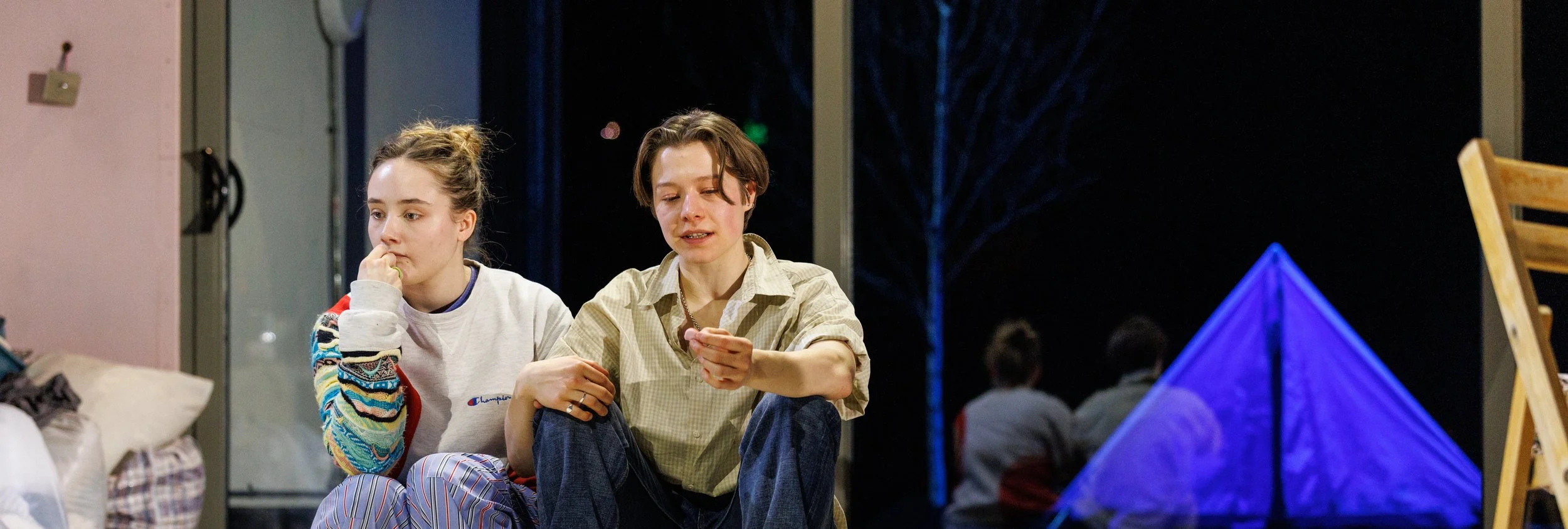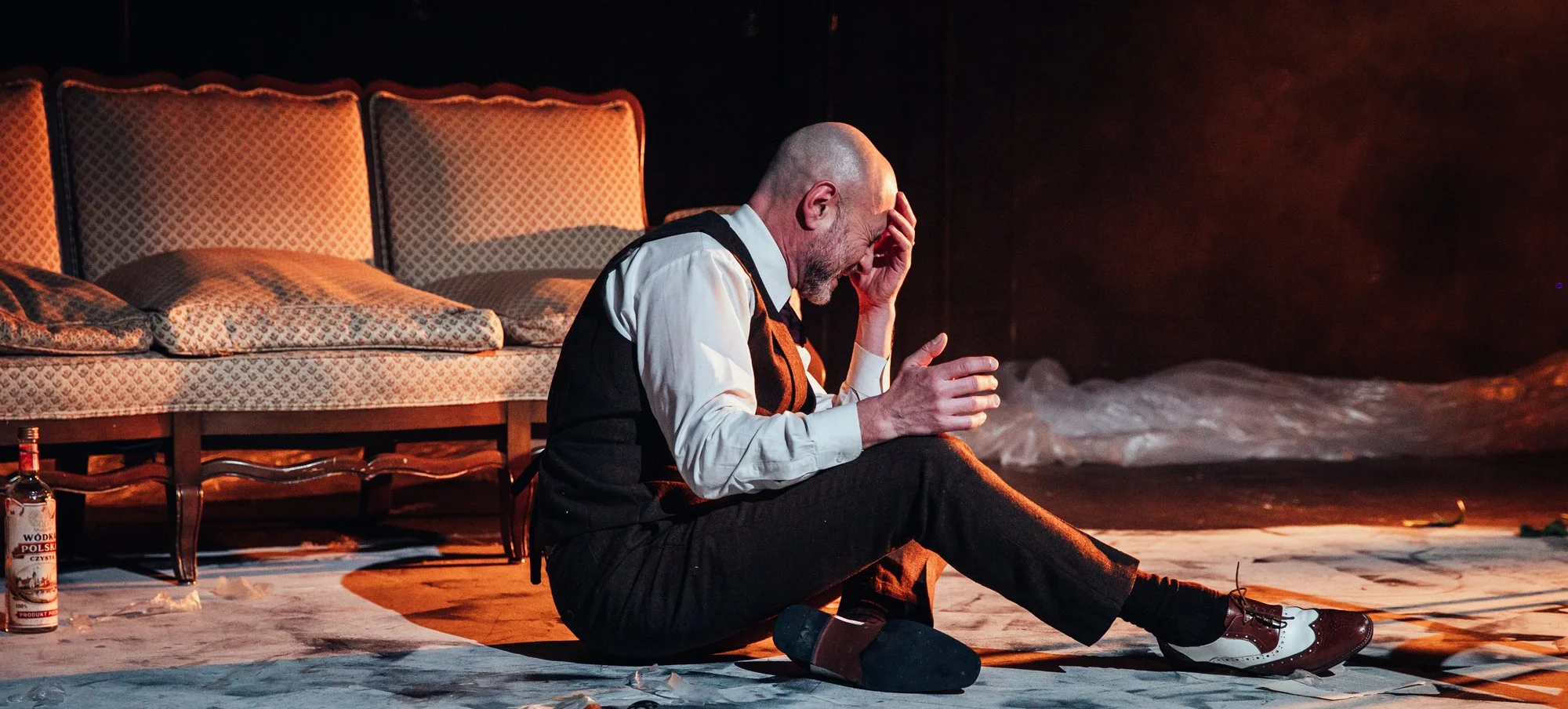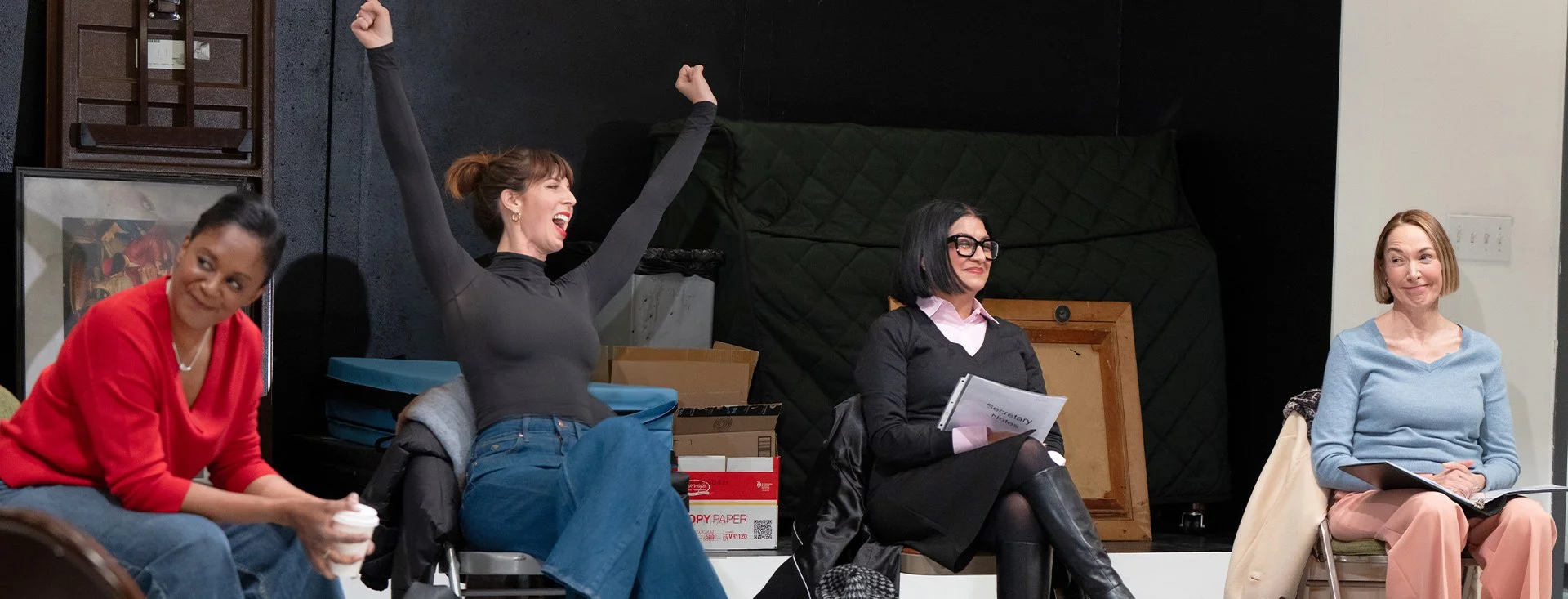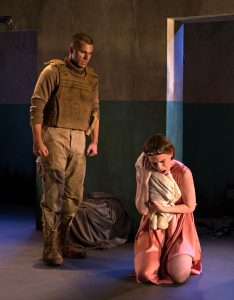The script for Simon Stone’s Medea at the Brooklyn Academy of Music (BAM) carries the notation “after Euripides.” Anyone who attends and expects tunics and armbands will therefore be disappointed: Stone has modernized the story of the spurned wife of Jason, the Argonaut who turned to the daughter of Creon for physical comfort. His version changes the names of the characters: Medea is Anna; Jason is Lucas; Creon is Christopher; and Creon’s daughter, who doesn’t appear in Euripides, is named Clara and is very much present.
When Women Burn
The visual imagery presented in The Flea's The Trojan Women strikes two seemingly disparate chords upon viewing. One is of The Rape of the Sabine Women, an ancient Roman story about soldiers who arrived on the shores of Italy. The men abducted and otherwise ravished a group of Sabine women. Another image, more overt (and one we are asked to leave the theater with), is the violent uprooting of millions of Syrian refugees from their homes. As Hecuba, Helen, Andromache and Cassandra bitterly mourn their fallen city, we cannot help but think of their lives in a foreign, hostile country, as they are carried off in boats that are almost as precarious as their hollow futures.
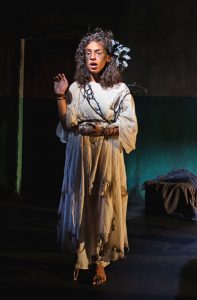
This resonance, sometimes obvious and sometimes thrillingly unspoken, is the beating heart of this drama, written by the silver-tongued Ellen McLaughlin. Enveloping this drama, which has survived well past its antiquarian origins, is the tragic, antediluvian helplessness of postwar women at the hands of their conquerors. It is the human tension of the play, with its mostly female cast, that rings through McLaughlin's words and lifts the story into beautiful, complex territories. Directed by Anne Cecelia Haney and under the much-lauded artistic directorship of Niegel Smith, this adaptation of Euripides' antebellum narrative, if occasionally flighty, is moving and cinematic in its scope.
The play begins with the drugged monotone of waves crashing against a beach, as we are welcomed into The Flea's downstairs theater. It seats perhaps forty—the intimacy of the space threatens our bubble of suspended disbelief. As if painted onto the wall, a turbaned, blindfolded woman sits, waiting. On the floor lie some six women—this is the Chorus—curled up and covered in grey blankets. The music of the sea gradually bestirs the blindfolded woman, and from her commanding voice and gait, we gather that she is Hecuba (played by a marvelous DeAnna Supplee), former queen of Troy and war prize for the Greeks. The women of Troy have been captured by their enemies the Greeks following the sack of Troy, and are waiting to be shipped off to kings' courts as slaves, concubines or second wives—harder luck perhaps than their Sabine ancestors. Cassandra (a powerful Lindsley Howard) and Andromache (Casey Wortmann, wonderful) are among the most haunted: the former has been 'made mad' by the god Apollo for spurning his love, and the latter is the widow of Hector, a fallen Trojan prince. All are violently helpless and burning with war trauma, with nothing to do but wait.
Haney has expertly interpreted McLaughlin's words, which retain most of the flair and poetry of Euripides' original. As the Trojan women dream of their future lives, they repeat stories of far off countries: "If you wash your hair in their rivers," one of them says, "they come out gold." Haney builds particular emphasis around this optimism, for it is mirrored in the current refugee crisis that has shaken the world with its sorrow. Here is where McLaughlin, who first adapted the story with the Bosnian war and its aftermath in mind, becomes fickle: the plot is held together by the barest of backbones, and for all the characters' elegies and monologues, there are times when the postwar narrative seems too forced, too distant. But when we are reminded, it is powerful: doctors, engineers and artists leave behind their burning cities for lives as taxi drivers, postmen and even unemployment, just as Hecuba, Andromache, and their once regal companions become less than their former selves. They resign themselves to lives of physical and emotional imprisonment.
Hecuba embodies all the nostalgia, mad sorrow and pride of her fallen Trojan citizens. Supplee delivers the fallen queen's lines with wounded ferocity; even when she whispers, there is weight and regality behind it. Tears shine perpetually in Hecuba's eyes—her only equal is Helen (Rebeca Rad), played with a great deal more pathos and wit than the original character is intended to have. In the 1971 film, starring the luminescent Vanessa Redgrave and Katharine Hepburn as Andromache and Hecuba respectively, Helen is a teasing, dangerous, one-dimensional male fantasy (both ancient playwright and seventies era director were male, after all). Rad anneals this fantasy with humanity; her lines are the most moving ones McLaughlin has written in the play.
The entrance of a male soldier, Talthybius (Phil Feldman) towards the end spins the play into a climax. Suffice it to say, he is dressed in combat gear and bears bad news for the women, just as they have seemingly reconciled themselves to their futures. In happier moments, the play has spontaneous moments of song and dance, welcome augmentations to the narrative. Lighting and sound design (Scot Gianelli and Ben Vigus respectively) are both characters of their own, booming and crackling with emotion as the play progresses. Both are also responsible for the cinematic sweep of the concluding scenes, perhaps some of the best minutes of The Trojan Women. Come for the nostalgia and the instructive, present performances, but stay for those dying moments.
The Trojan Women runs through Sept. 26. Performances are Thursday through Saturday at 9 p.m. and Sunday at 3 p.m. Tickets are $15-$20 with the lowest priced tickets available on a first-come, first-served basis. The Flea Theater is located at 41 White St. between Church St. and Broadway. Purchase tickets by calling 212-352-3101 or visit theflea.org.

